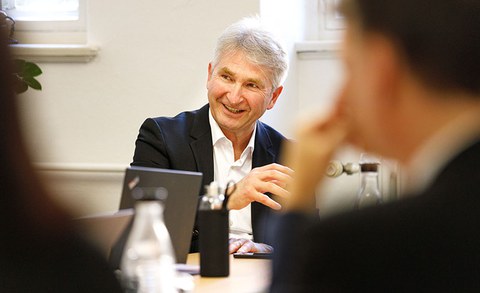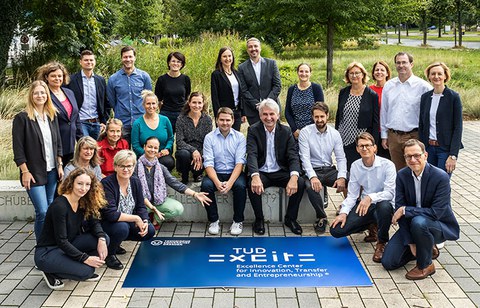17.11.2023
Damit gute Ideen nicht im Wissenschafts-Elfenbeinturm versacken
Dagmar Möbius
Im September 2023 nahm das Exzellenzcenter für Innovation, Transfer und Entrepreneurship „TUD|excite“ offiziell seine Arbeit auf. Kontakt-online sprach mit dem Direktor, Professor Andreas Pinkwart, über Innovationen, Patent-Ranking und New Work.

Prof. Andreas Pinkwart ist Direktor des neuen Exzellenzcenters für Innovation, Transfer und Entrepreneurship „TUD|excite“.
Wann und warum entstand die Idee zu dem neuen Zentrum?
„TUD|excite“ wurde im Rahmen der laufenden TUD-Exzellenzinitiative entwickelt. Wir wollen vor allem Synergien bündeln, um die Innovationskette zu stärken. So werden künftig Aktivitäten zum Schutz geistigen Eigentums (IP-Management), des Wissens- und Technologie-Transfers zu Unternehmen und des TUD-bezogenen Startup-Services dresden|exists unter einem Dach vereint. „TUD|excite“ versteht sich als zentrale Einrichtung. Bei der offiziellen Eröffnungsveranstaltung Mitte Oktober 2023 wurde allen Interessierten die Arbeitsweise des neuen Centers und sein Beitrag zur Transferstrategie des Landes vorgestellt.
Sie wurden mit der Leitung des hochschulweiten Centers beauftragt. Wer hat mitentwickelt und wo sitzt das neue Center?
Mit „TUD|excite“ haben wir eine Form gefunden, die zur TU Dresden hervorragend passt. Wir machen nicht alles neu, sondern einiges noch besser. Die Vorläufereinrichtungen haben wichtige Arbeit geleistet, die sie nun mit insgesamt rund 30 Kolleginnen und Kollegen unter einem Dach weiterentwickeln und weiterführen. Noch sind alle sechs Einheiten (Unit Patents, Unit Innovate, Unit Startup, Unit Talents, Unit Facilitate, Unit Futurelab) auf mehrere Standorte verteilt, teilweise auch außerhalb des Campus. Im Laufe des kommenden Frühjahrs soll das komplette Center im Andreas-Schubert-Bau der TU Dresden inmitten eines attraktiven Ecosystems auf dem Campus beheimatet sein.
Wie sieht die konkrete Arbeit des Exzellenzzentrums aus?
Wir bedienen eine breite Klaviatur, damit gute Ideen nicht im Wissenschaftselfenbeinturm versacken. Von der frühen Anfrage bis zum Abbilden von Best-Practice-Beispielen, von Patentanmeldungen bis zu Unternehmenskooperationen und Entwürfen für neue Formate der Unternehmensgründung. Mit der TUDAG ordnen wir die Verwertung von Patenten neu. Wir wollen Anreize dafür schaffen, Patente zu schützen, zu verwerten und zu nutzen.
(lacht) Wir beschäftigen uns nicht mit uns selbst. Innovation trägt dazu bei, die großen gesellschaftlichen Herausforderungen wie Klimawandel, Ressourcenknappheit, Demografie, Digitalisierung und KI zu bewältigen. Unsere Arbeit ist sehr konkret: Wir wollen Ideen und Erfindungen aus der TUD aus dem Blickfeld der Innovation umsetzen. Und wir wollen jenen helfen, die noch nicht so viel Erfahrung haben und ihnen unser Netzwerk öffnen und Handlungssicherheit geben.

Das Team von "TUD|excite"
In großen Institutionen mit vielen Beteiligten sind Innovationen nicht immer leicht auf den Weg zu bringen. Was machen Sie anders als andere?
Der Sinn und die Motivation unserer Arbeit ist, dass wir uns als Ermöglicher sehen. Wir können diese Welt nicht komplett neu erfinden, aber wir möchten das Leben für die Menschen besser und nachhaltiger machen. Es ist unter anderem ein neues Zukunftslabor im „TUD|excite“ geplant. Das Future Lab wird sich wissenschaftlich und experimentell mit den neuesten internationalen Entwicklungen und Methoden des Innovations- und Technologiemanagements befassen und sie für unsere Arbeit nutzbar machen.
An der TUD gibt es 17 Fakultäten in fünf Bereichen. Wir wollen möglichst interdisziplinär und wenig hierarchisch arbeiten, und bevorzugen agile Strukturen und neue Arbeitsformen im Sinne des New Work. Für alle mit Transferthemen befassten Fachleute werden wir gezielte Qualifizierungsprogramme entwickeln. Gründerteams bieten wir Inkubatorenprogramme an. Sie werden durch einen leistungsstarken Akzellerator für Deep-Tech-Startups ergänzt, den wir mit erfahrenen Partnern gemeinsam aufbauen.
Was lässt sich zu den Innovationsscouts sagen?
Innovationsscouts unterstützen Forschende und Cluster frühzeitig beim Aufspüren und bei der Entwicklung von Projekten mit hohem Transferpotential. Die TU Dresden gehört zu den technischen Spitzenuniversitäten und sie hat von allen mit Abstand die meisten Patente. Verwertungserfolge in Form von Lizenzen und Beteiligungen an Ausgründungen wurden erzielt. Diese nachhaltig angelegte Aufgabe wollen wir künftig noch effektiver gestalten und den Mittelrückfluss an die TUD erhöhen.
Welche innovativen Beispiele sind schon spruchreif?
Es gab bereits zahlreiche erfolgreiche Ausgründungen wie Novaled oder Heliatek. Bei letzterem Unternehmen geht es um die Herstellung flexibler PV-Folien, die an Wänden und Scheiben angebracht werden können und nicht aufs Dach montiert werden müssen. Aktuelle Beispiele liefern SpiNNcloud Systems (SCS), die Chips für KI-Anwendungen entwickeln, die mit deutlich geringerem Energieaufwand verbunden sind, oder das Team von Altavo, die Stimmlosen wieder eine Stimme geben wollen. Die Stimmerzeugung erfolgt dabei über Radar-Sensorik und künstliche Intelligenz. Auf Lizenzbasis stellt die TUD ein Verfahren zur Verfügung, mit dem bei der Herstellung von Eiern männliche Küken möglichst früh vor dem Ausbrüten erkannt werden.
Was ist für Alumni besonders interessant?
Wir sehen uns am TUD|excite als Intermediäre, die die verschiedenen Transferpartner vertrauensvoll zusammenbringen und faire Vereinbarungen und beste Verwertungsformen ermöglichen. Für diese Aufgaben qualifizieren wir uns und die relevanten Beteiligten fortlaufend und entwickeln entsprechende Angebote. Wir sind dankbar für auf diesen Gebieten erfahrene Alumni, die ihr Wissen als Dozentinnen und Dozenten, als Mentorinnen und Mentoren oder Coaches teilen wollen, auch international. Weltweit können Alumni dazu beitragen, Netzwerke für Startups und Erfindungen aus der TUD zu erschließen und Türen zu öffnen. Wir werden nationale und internationale Roadshows machen. Mit jeder „Ermöglichmacherin“ und jedem „Ermöglichmacher“ aus dem Kreis der Alumni wächst die Innovationsstärke der Universität und ihr Impact für das Innovationsgeschehen.
Vielen Dank, Herr Professor Pinkwart, für das Gespräch und alles Gute für „TUD|excite“!
Kontakt:
TUD|excite
Exzellenz-Center für Innovation, Transfer und Entrepreneurship
Prof. Andreas Pinkwart, Direktor
